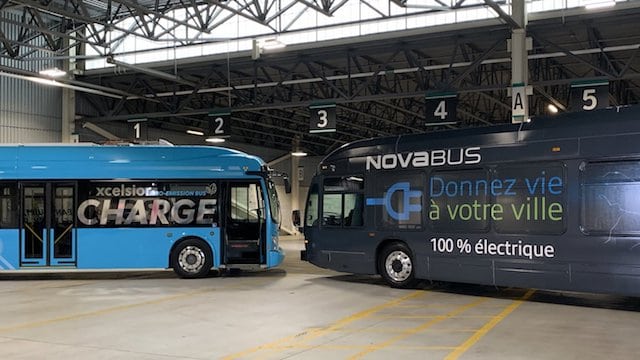Electric Buses Are Coming To Brampton Soon
Published July 29, 2019 at 7:40 pm

Electric buses are coming to Brampton soon!
Electric buses are coming to Brampton soon!
The Minister of Environment and Climate Change Catherine McKenna recently announced an investment of $7.6 million from the Low Carbon Economy Fund toward fully interoperable battery-electric buses and high-powered, overhead, on-route chargers in Brampton. This will replace the city’s diesel buses and significantly reduce greenhouse gases and air pollution.
Minister McKenna also announced, on behalf of the Honourable Amarjeet Sohi, Canada’s Minister of Natural Resources, a $3.5-million investment from the Natural Resources Canada’s Green Infrastructure Program to help the city procure, install, operate and maintain four 450kW overhead bus-charging stations and eight battery-electric buses.
“Cleaner vehicles are good for our communities, our economy and our environment. Our government’s investment in Ontario’s electric bus network will help support innovative Canadian companies and good jobs in Canada’s cleantech sector while keeping our air healthy and fighting climate change, so we can build a cleaner future for our kids and grandkids,” says Minister of Environment and Climate Change Canada Catherine McKenna.
The breakthrough battery-electric buses with zero tailpipe emissions will be launched on two existing conventional routes in Brampton: routes 23 Sandalwood and 26 Mount Pleasant. New overhead on-route charging stations will be launched at the Mount Pleasant Village terminal, the Queen Street/Highway 50 Züm station and the Sandalwood Transit Facility.
The electric buses will arrive on Brampton’s streets in late 2020/early 2021.
“Brampton recently joined 35 other communities in declaring a climate emergency. Our goal is to reduce greenhouse gas emissions in Brampton by 80 percent by 2050, and we are planning and launching better policies and technology to support our priority to develop a green city,” says Mayor Patrick Brown. “A well-connected transit network is critical to building our position on Canada’s innovation corridor. The new e-buses are a testament to the council’s commitment to reducing our carbon footprint and building a green city.”
The entire project will cost an estimated $15.96 million. However, the Government of Canada will provide $11.15 million in funding towards Brampton’s portion of the Pan-Canadian Electric Bus Network.
Led by the Canadian Urban Transit Research and Innovation Consortium (CUTRIC), the Pan-Canadian Electric Bus Demonstration and Integration Trial were launched at TransLink in Vancouver on April 2018 as part of a nationally coordinated effort to advance zero-emissions transit technology.
Phase 1 of the pilot project will test battery-electric buses in Brampton. The funding for Brampton’s participation in Phase 1 of the CUTRIC Pan-Canadian Electric Bus Demonstration and Integration Trial will be administered through Natural Resources Canada using a portion of Ontario’s Low Carbon Economy Leadership Fund allocation.
“This investment launches the largest interoperable system in play with the most intense use of a high-power charging system on-route in Canada. With eight e-buses and four overhead chargers in Brampton as part of the Pan-Canadian Electric Bus Demonstration and Integration Trial, today’s announcement marks the moment Canada has become an unquestioned world leader in e-mobility,” says Executive Director and CEO of CUTRIC Josipa Petrunic.
New Flyer Industries and Nova Bus will manufacture the battery-electric buses, and Asea Brown Boveri and Siemens will provide the on-route chargers.
Brampton Transit currently operates 441 buses in its fleet, including 121 diesel-electric hybrid Züm bus rapid transit buses.
What do you think about electric buses?
Photo courtesy of Sonia Sidhu
insauga's Editorial Standards and Policies advertising





